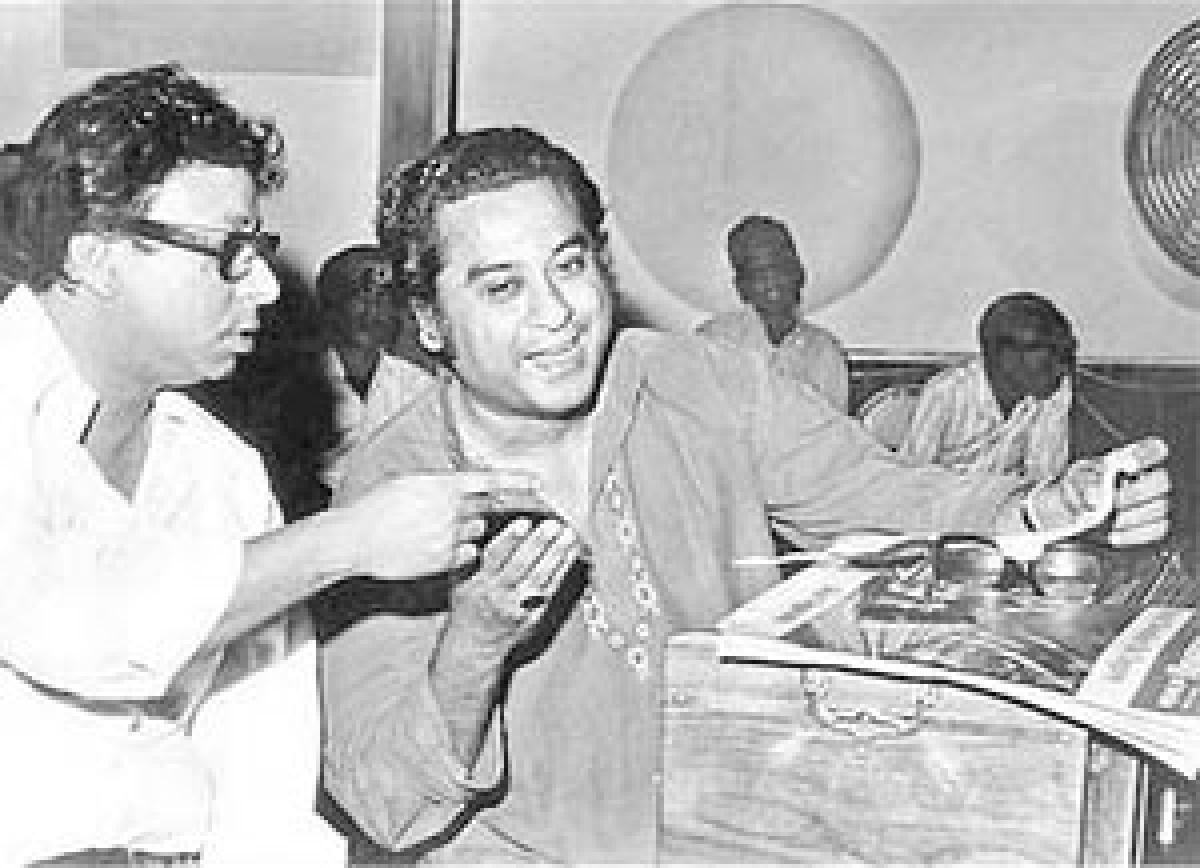Live
- 2024 on track to be hottest year on record
- PM Modi’s visit to Solapur: Women applaud ‘Double-Engine’ government’s initiatives
- Nagarkurnool MLA Dr. Kuchukulla Rajesh Reddy Campaigning in Maharashtra Elections
- Wife Kills Husband with Her Lover: Details of Veldanda Murder Case Revealed by SP Gaikwad
- Strict Action on Violations of Food Rights: Telangana Food Commission Chairman Goli Srinivas Reddy
- Smooth Conduct of Group-3 Exams with Strict Security Measures: Collector Badavath Santosh
- Delhi HC orders cancellation of LOC issued against Ashneer Grover, wife
- Shami’s absence a major blow for India in BGT, says Paul Adams
- Will organize protests at borders if attack on minority Hindus in Bangladesh not stopped: Bengal LoP
- Dutch Ambassador Marisa Gerard Meets Telangana CM A. Revanth Reddy in Delhi
Just In

Writing a mood piece on a singer who is capable of lifting your mood 24x7, 365 days can be taxing for any fan. Weaned on the songs rendered effortlessly in a booming, naturally gifted voice for over four decades and more can disorient one to such an extent that it becomes a genuine problem as to where to begin.
87th birth anniversary of Kishore Kumar
Writing a mood piece on a singer who is capable of lifting your mood 24x7, 365 days can be taxing for any fan. Weaned on the songs rendered effortlessly in a booming, naturally gifted voice for over four decades and more can disorient one to such an extent that it becomes a genuine problem as to where to begin.
Versatility, variety and sheer vivacity…. all these phrases have been used ad nauseam over years when the legend was alive and over nearly three decades since he passed away in October 1987. But for his legions of fans, including the modern-day Pakistani singers who croon a few numbers in Hindi cinema, he was an irrepressible icon of immeasurable talent, who could not only involve them into his songs but send them into spasms of ecstasy, over and over.
That he could sing, act, compose music, wield the megaphone and create watchable cinema was a great advantage working in his favour. Hence, Abhas Kumar Ganguly, aka Kishore Kumar, born on August 4 (1928-1987) can be seen as a dynamic film personality who came into the field, post-Independence, riding piggyback on big brother, cine hero Ashok Kumar’s assuring shoulders, morphed from being a KL Saigal clone to a clown who could also sing and ultimately rising in the 60’s to being the only singer worth reckoning for a decade and more - what Hindi film observers, historians and lovers achingly refer to as the final decade of the golden era of Indian cinema.
For the baby boomers who are still partial to listening to music of the bygone era, Kishore Kumar allowed none other to overshadow him. The frenzy which enveloped the first Superstar of Indian cinema, Rajesh Khanna was in large measure due to the sonorous songs of Kishore Da who recreated roles that ‘Kaka’ played a pilot, an aristocrat, a playboy, a friend, a terminally-ill patient, a suspicious lover, a socially conscious activist, a driver and so on.
With a 20+ generation in the freshly liberated country, open to experimenting with both Western and Indian classical music forms, Hindi cinema was the place to be for anyone who thought they could make a mark. A fresh crop of young faces - many of whom are presently directors and proud star fathers - were given a leg-up by the Khandwa-based Bengali gentleman, who did not differentiate between the top and the not-so-hot leading men.
Jeetendra, Navin Nischol, Rakesh Roshan, Shatrughan Sinha, scions and siblings of Raj Kapoor, Vinod Khanna… all crooned his numbers, even as the films in which they featured had a mixed run at cash counters. What distinguishes Kishore Da from his exemplary peers is that he had a dual run in the film industry, which saw him make his debut in the late 40s, fade away for a brief period and re-emerge as the dark horse, roughly two decades later, permanently putting into shade all his competitors.
This included Mohammed Rafi, the matchless magician of film songs, who had to slow down initially and later included as an afterthought in many of the films, as the mantle passed on simultaneously from Rajesh Khanna to Amitabh Bachchan, who continued with Kishore Da as his playback voice. As he ground to a halt in the late ‘80s, he had by then belted out numbers for successors of Big B like Anil Kapoor, Govinda and others.
From the black-and-white era to that of disco dances, from working with small names to established legends, cutting across genres and levels, pairing with his counterparts and adding value to the riotous mood that he was capable of, Kishore Kumar was peerless. This included his personal life too, in which he underwent four marriages, two of his wives still alive and one, presently a consort of an erstwhile disco king, Mithun Chakraborty. From Madhubala to Leena Chandavarkar, his trophy wives were much loved and sought after when they were active in cinema.
As a worthy successor to Rafi, it would be no exaggeration if it is said that in terms of playback singing, the ‘60s changed the way Indians all over the world listened to music. The millennials, who have rap and pop to go along with their regional songs and dance items today, still pause and hear Kishore Da, who is among the top as an evergreen singer whose songs are re-mixed and ‘butchered’ leisurely by the Gen-Y. It may sound clichéd, but they don’t make geniuses like him anymore. Happy birthday Kishore Da!
BY K Naresh Kumar

© 2024 Hyderabad Media House Limited/The Hans India. All rights reserved. Powered by hocalwire.com







